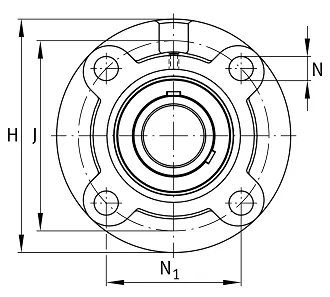Nov . 09, 2024 05:38 Back to list
High-Quality Deep Groove Ball Bearings for OEM Applications and Industrial Use
Understanding OEM Deep Groove Ball Bearings A Comprehensive Overview
Deep groove ball bearings are one of the most commonly used types of bearings due to their versatile design and ability to accommodate a variety of loads. In the world of manufacturing and OEM (Original Equipment Manufacturer) applications, these bearings play a pivotal role in ensuring machinery operates smoothly and efficiently.
What are Deep Groove Ball Bearings?
Deep groove ball bearings are characterized by their deep raceway grooves, which enable them to support both radial and axial loads. They consist of an outer ring, an inner ring, a cage, and balls. The design allows for high-speed operation and reduced friction, making them an ideal choice for numerous applications ranging from electric motors to automotive equipment and industrial machinery.
Key Features
1. Versatility Deep groove ball bearings can be used in a variety of applications, whether in high-speed motors or heavy machinery. They are capable of supporting loads in both radial and axial directions. 2. Durability Made from high-quality materials like chrome steel, stainless steel, or ceramic, deep groove ball bearings are built to withstand wear and tear over long periods, reducing the need for frequent replacements.
3. Low Noise and Vibration The design of these bearings minimizes friction, which translates to quieter operation and reduced vibration, crucial in sensitive applications like precision instruments and consumer electronics.
4. Wide Range of Sizes Available in various sizes and configurations, OEM deep groove ball bearings can be tailored to meet the specific needs of any application, making them a preferred choice for many manufacturers.
Importance of OEM deep groove ball bearings
OEMs often seek deep groove ball bearings to fulfill their high performance and reliability standards. Here are several reasons why they are essential in OEM applications
oem deep groove ball bearing

2. Improved Performance By using deep groove ball bearings, OEMs can ensure their products have enhanced performance characteristics, which can lead to improved efficiency and prolonged service life.
3. Cost-Effectiveness Despite the initial investment, the longevity and reliability of deep groove ball bearings can lead to reduced maintenance costs, making them a cost-effective option in the long run.
4. Customization OEM manufacturers can work closely with bearing producers to create custom solutions that are designed to fit unique applications, which can optimize the performance of the final product.
Applications of Deep Groove Ball Bearings
The applications of deep groove ball bearings are vast and varied
- Electric Motors They are widely used in electric motors where high speeds and smooth operation are essential. - Automotive Industry From wheel hubs to gearboxes, deep groove ball bearings provide the necessary support for many automotive components.
- Industrial Equipment Machinery in manufacturing plants, pumps, and conveyors benefit from the reliability and performance of these bearings.
- Consumer Electronics Devices like washing machines, air conditioners, and hard drives incorporate deep groove ball bearings to ensure efficient operation and longevity.
Conclusion
In summary, OEM deep groove ball bearings are integral components in a multitude of industries. Their ability to support both radial and axial loads, coupled with their durability and cost-effectiveness, makes them a highly sought-after choice for manufacturers. As industries continue to evolve, the demand for these bearings will likely grow, and innovations in design and materials will further enhance their role in OEM applications. For manufacturers looking to optimize their products, investing in high-quality deep groove ball bearings can significantly contribute to achieving operational excellence and maintaining a competitive edge in the market.
Latest news
-
25MM 2 BOLT UCFLX05-14 Flange bearing unit( oval)
NewsMar.07,2025
-
4 bolt UCF 200 series Pillow block bearings
NewsMar.07,2025
-
25MM 2 BOLT UCFLX05-14 Flange bearing unit( oval)
NewsMar.07,2025
-
UCF216-50 4-Bolt Flange Housing Square Bearing
NewsMar.07,2025
-
25MM 2 BOLT UCFLX05-14 Flange bearing unit( oval)
NewsMar.07,2025
-
spherical roller bearing material exporter
NewsMar.07,2025





